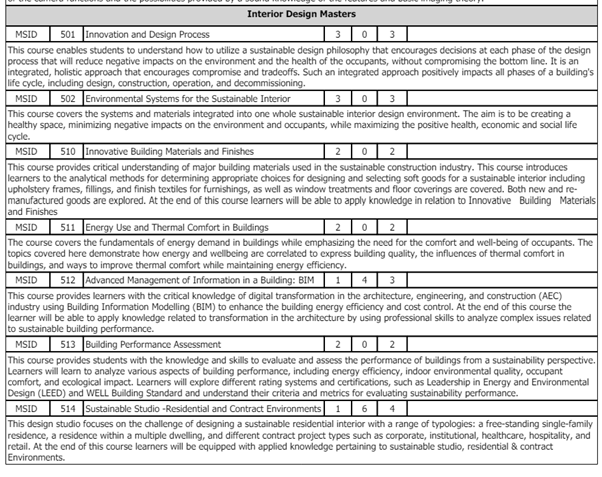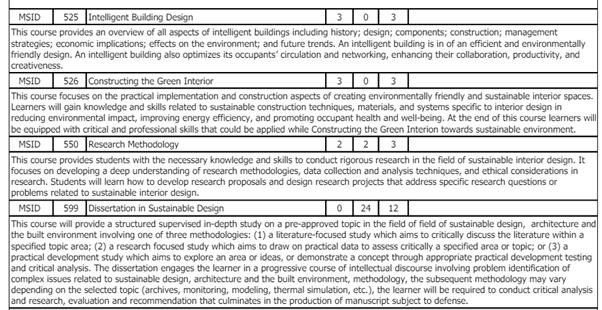Ahlia University in Bahrain offers a range of environmental and sustainability-focused courses at both undergraduate and postgraduate levels, reflecting its commitment to integrating sustainability into its academic programs.
Undergraduate Courses
https://www.ahlia.edu.bh/cms4/wp-content/uploads/2022/11/Course_Description-4.pdf
Ahlia University incorporates sustainability themes into various undergraduate programs. For instance, the Bachelor's degree in Interior Design includes courses such as "Materials & Application in Design," which focuses on sustainable materials and their applications in interior spaces. Additionally, courses like "Building System & Interior Codes" emphasize sustainable building practices and compliance with environmental standards. These courses aim to equip students with knowledge and skills related to sustainable design and environmental considerations in their respective fields.




Postgraduate Programs
At the postgraduate level, Ahlia University offers specialized programs that delve deeper into sustainability and environmental management:
Master of Science in Sustainable Interior Design (MSID):
This program is designed to prepare design professionals to develop and maintain sustainable interior spaces. It covers topics such as innovative building materials, energy use and thermal comfort in buildings, and building performance assessment, aiming to create environmentally responsible and energy-efficient interior environments.

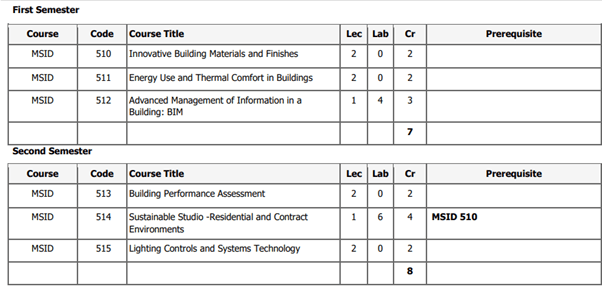

Master of Science in Sustainable Management
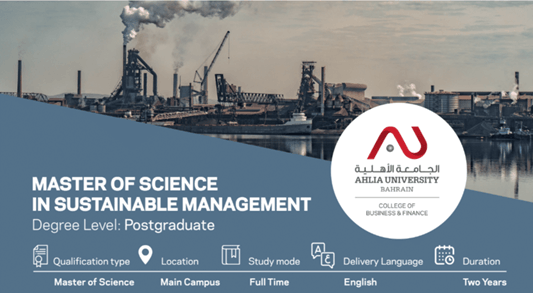
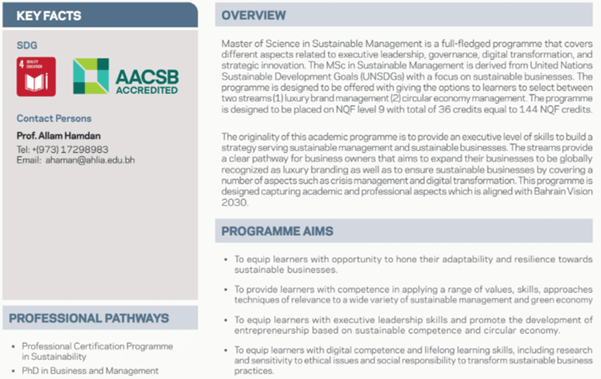
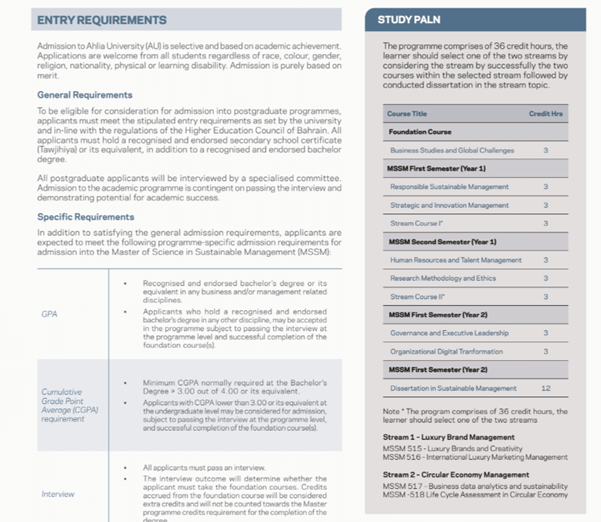
Sustainability in Education
https://www.ahlia.edu.bh/ahlia-university-sustainability/sustainability-in-education/
Ahlia University emphasizes sustainability in its educational approach by integrating themes such as citizenship, leadership, lifelong learning, and sustainability literacy into the learning process. The university provides an active student-centered learning environment where sustainability is actively supported, equipping students with the skills and perspectives to address real-life environmental challenges.
One of the strategic objectives of Ahlia University is to create an exceptional learning environment characterized by high quality academic and co-curricular programs, excellent and innovative teaching, to prepare students for success in the global labor market and to contribute to the prosperity of society.
The University ensures sustainability in education by focusing on the learning process which includes themes such as citizenship, leadership, lifelong learning, experiential learning, and sustainability literacy.
The University provides many sustainability-related courses in which students are exposed to sustainability in various fields. Ahlia University provides an active student-centered learning environment in which sustainability is also actively supported.
Students learn together and from each other, in and out of the classroom, to become critical and engaged citizens. Concepts of and strategies for sustainability are integrated into AU programming, pedagogy and assessment, equipping the students and staff with the skills, values, experiences, and perspectives to address the current real-life challenges. The University providse a range of teaching and learning strategies including internships that provide students with opportunities to enhance their employability and which fosters lifelong learning.
In the light of its vision, values and the goals and strategic objectives, AU has a clearly articulated philosophy regarding teaching and learning.AU's philosophy of teaching and learning is composed of two central ideas:
To provide a learner-centred environment that promotes excellence, intellectual curiosity and independent learners
provide a transformative learning experience so that graduates not only have the knowledge, skills and competencies required by their disciplines but have developed the attributes to be robust engaged members of society with a strong moral code.
Al-Hawaj: We have succeeded in incorporating 7 sustainable development goals into our curriculum
https://www.alayam.com/online/local/902687/News.html
Officials, academics and researchers stressed the importance of the participation of universities and various institutions of the civil sector in achieving the Sustainable Development Goals, stressing the importance of education in addressing many emerging issues and challenges, provided it is a good education and keeping pace with the rapid developments in the labor market.
Participants at the Forum on the Impact of Higher Education Efforts on the Sustainable Development Goals called for the learning experience under the Covid 19 pandemic to promote self-learning and learning options through research, analysis and optimal investment in intellectual capital.
This came at the forum on the impact of higher education efforts on the United Nations Sustainable Development Goals organized by the Community University with the participation of a number of universities, educational bodies, quality bodies, international accreditation bodies and representatives of students and employers.
The founding President and Chairman of the Board of Trustees of the National University, Professor Abdullah Al-Hawaj, opened the forum and praised the goals of the United Nations for sustainable development and its positive effects on the development of economies, particularly the Bahraini experience, in which the distinguished government led by His Royal Highness Prince Salman bin Hamad Al Khalifa, Crown Prince, Prime Minister, may God save him, look forward to building a strong economy in accordance
Professor Al-Hawaj stressed the interest of the Community University in integrating 7 sustainable development goals into its curricula and university activities, which resulted in the university's inclusion among the partners of the United Nations in achieving eligibility goals, stressing the importance of partnership between universities and scientific institutions and the efforts of the United Nations in achieving the Sustainable Development Goals.
Professor Esmat Jaafar, director of the National Framework Operations Department of the Education and Training Quality Authority, who reviewed the role of the National Qualifications Framework in achieving the United Nations Sustainable Development Goals, participated in the forum, focusing on the fourth goal in particular: quality education.
She said that the National Qualifications Framework contains 10 integrated stages that accommodate education in its various dimensions, stages and institutions, and reviewed the efforts of the Education and Training Quality Authority to help higher education institutions achieve the quality of education.
The national framework was concerned with the quality of educational institutions, the quality of their programmes and more motivated educational institutions to respond optimally to the requirements of the labour market.
Dr. Amina Boualay, Head of Scientific Research at the Council of Higher Education, participated in the meeting, where she spoke about intellectual capital and its key role in achieving high education with good specifications, and stated that intellectual capital is important for many students, institutions, countries and sectors.
She stressed that attention to intellectual capital created better opportunities for universities, and said that the reputation and standards of universities could be negatively or positively affected based on the type of knowledge they defined, created and presented to students. Intellectual capital had become different after the COV pandemic crisis, where students had the option of university or distance education, which in turn had changed the concept of intellectual capital, as a result of changing methods of education and teaching.
She stressed the responsibility of academics to follow educational methods in keeping with current and future changes and developments.
The forum was attended by The President of the World Organization for Sustainable Development (wasd), Professor Allam Ahmed, who stressed the importance of the role of universities in achieving the Sustainable Development Goals, stressing that the success of the great powers in this area was thanks to the initiative of the presence of their universities. The role of universities did not end with the graduation of competencies, but rather helping them integrate into the labour market and to be positive elements of society in playing an active role in achieving positive change.
Professor Allam Ahmed reviewed the Egyptian experience in developing a sustainable development plan, noting that each country has some peculiarities in achieving the Sustainable Development Goals and that gender equality and the provision of quality education opportunities are one of the most important priorities for sustainable development in the Arab region.
Professor Yusuf Abdul Ghaffar, president of the Regional Social Responsibility Network, also spoke at the forum, addressing the issue of unemployment in the Arab world and the role of education in addressing this problem by keeping up with developments and developments. In his speech, Professor Yusuf Abdul Ghaffar called for promoting academic freedom, the independence of educational institutions and the involvement of universities in community concerns in order to participate positively in addressing them. While stressing the need to enhance the presence of hands-on training in university programs and curricula, Abdul Ghaffar stressed the importance of demonstrating the spirit of partnership and cooperation between different universities rather than competing with each other.
Mr. Betty Lofi, an economist at the United Nations Development Office, spoke about the impact of sustainable development measures by higher education institutions, stressing the importance of university participation in promoting community awareness of global challenges such as poverty, education, the environment, etc.
Luffy stressed the Conviction of the United Nations that sustainable development could not be carried out solely on the basis of the efforts of Governments, as efforts must be made by society and various sectors to achieve them. He spoke of the four key roles that higher education institutions play in sustainable development, where they must teach students about sustainable development and even include it in their curricula, support research on sustainable development, and university participation in society; they not only teach but apply, and universities should share knowledge with other universities. Sustainable development covered everyone, including poor and rich nations, and everyone could play an important role in their implementation.
Policy Impact And Big Data Conference - Sustainable Development Goals (Sdgs)
The conference seeks to promote and support the Sustainable Development Goals as part of Transforming our world: the 2030 Agenda for Sustainable Development. In particular, the conference themes will seek to promote and support Goal 9: Build resilient infrastructure, promote inclusive and sustainable industrialization and foster innovation.

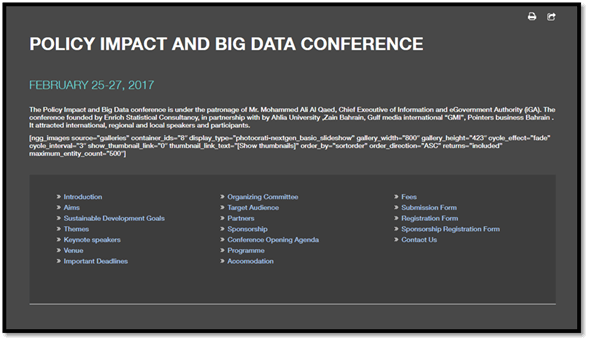
Quality Assurance Manual V.04
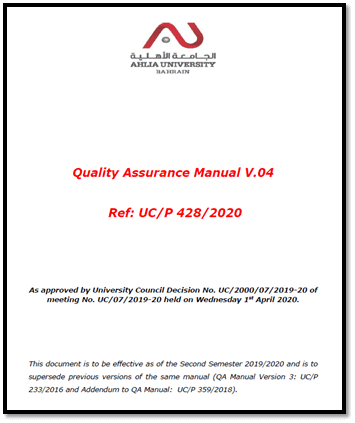
|
SDG |
University Programs |
|
SDG3: Good Health and Wellbeing |
Bachelor's degree in physiotherapy Bachelor's degree in interior design Bachelor's degree in mass communication & public relations |
|
SDG5: Gender Equality |
Bachelor's degree in mass communication & public relations Bachelor's degree in information technology Bachelor's degree in economics & finance |
|
SDG6: Clean Water and Sanitation |
Bachelor's degree in interior design |
|
SDG7: Affordable and Clean Energy |
Bachelor's degree in interior design Bachelor's degre in mobile and network engineering Bachelor's degree in information technology Bachelor's degree in management information systems |
|
SDG8: Decent Work and Economic Growth |
Bachelor's degree in banking & finance Bachelor's degree in economics & finance Bachelor's degree in mass communication & public relations |
|
SDG9: Industry, Innovation and Infrastructure |
Bachelor's degree in physiotherapy Bachelor's degree in interior design Bachelor's degree in mass communication & public relations Bachelor's degre in mobile and network engineering Bachelor's degree in information technology Bachelor's degree in management information systems Bachelor's degree in banking & finance Bachelor's degree in economics & finance |
|
SDG11: Sustainable Cities and Communities |
Bachelor's degree in banking & finance Bachelor's degree in economics & finance |
|
SDG12: Responsible Consumption and Production |
Bachelor's degree in banking & finance Bachelor's degree in economics & finance |
|
SDG16: Peace, Justice and Strong Institutions |
Bachelor's degree in banking & finance Bachelor's degree in economics & finance |
Table 1. Table SDG
Interior Design Courses
https://www.ahlia.edu.bh/cms4/wp-content/uploads/2024/04/Course_Description.pdf

